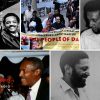Dignitaries and presidents, media stars, and celebrities from around the world converged on South Africa to pay their respects to Nelson Mandela, the warrior for racial justice. While, in America, racial justice is a still a battle.
In 1918, Nelson Rolihlahla Mandela was born into racial oppression. By 1948, South Africa legalized a racial segregation system called apartheid, based on America’s “separate but equal” doctrine which separated the races from White, or Afrikaans, and then into racial groups – Black, Colored, and Indian.
Trained as a lawyer, Nelson Mandela challenged legal segregation and oppression of his people at a time when civil rights attorneys in America were fighting segregation. Mandela and Oliver Tambo established South Africa’s first Black law firm.
Mandela joined the African National Congress and led a campaign of guerrilla warfare against his government. Captured and labeled a terrorist, and sentenced to life for which he served 27 years, mostly in solitary confinement. On February 11, 1990, Nelson Mandela walked free from prison at age 62.
Unlike Americans, Mandela did not deny hundreds of years of racial oppression. Denial could not bring about the forgiveness that Nelson Mandela offered to his fellow Nobel Peace Prize recipient, F.W. de Klerk, the last White President of South Africa. These men first met when Mandela was incarcerated.
In 1993, Nelson Mandela said of de Klerk: “I would like to take this opportunity to join the Norwegian Nobel Committee and pay tribute to my joint laureate Mr. F.W. de Klerk. He had the courage to admit that a terrible wrong had been done to our country and people through the imposition of the system of apartheid.”
In 1995, South African convened a Truth and Reconciliation Commission to allow those harmed by a century of racial oppression to speak. And, those politicians who created oppressive laws as well as those officers who brutally enforced those laws to stand before once biased courts and admit to their crimes.
Black South Africans testified on national television to life in slums without running water or toilets. They spoke of murder, torture, and kidnapping by police. Students and teachers testified to schools without books, chairs, and heat. South African men and women spoke of searches, beatings, arrests and living with constant fear.
However, America has had no real Truth and Reconciliation Commission. Instead, it creates commissions with limited power after racial unrest and then publishes a report. America’s first Race Commission followed the Chicago Race Riots of 1919.
In the riot, 23 Blacks and 15 Whites died in attacks by poor Whites. A 700 page report, published in 1922, was created to educate European immigrants on how to live with the African-Americans who had come North looking for jobs and freedom.
The Kerner Commission on civil disorders was convened after the riots of 1967. Its report warned that poverty, police abuses, unemployment, and poor housing educational opportunities resulting from racism led to urban unrest in Black communities. This Report was ultimately ignored.
In 1992, after the Rodney King riots in Los Angeles caused 53 deaths and 2,000 injuries, a commission was convened. Rioted followed the acquittal of police who had been videotaped viciously beating Rodney King in a park. That post-riot report titled The City in Crisis pointed to frustration over racial oppression and police abuse led to rioting.
In 1997 President Bill Clinton convened a Race Commission. It was led by renowned African-American historian John Hope Franklin. The Commission’s report titled “One America in the 21st Century: The President’s Initiative on Race” had no legal power to make changes. Testimony was not televised.
Without a Truth and Reconciliation Commission America’s racial pain will be left to fester. When Nelson Mandela became President of South Africa, he changed the Constitution and ended racially biased laws and police abuses.
In America, where Supreme Court decisions deny the reality of racial discrimination in voting, employment, and education and laws such as “stop, question, and frisk” and “Stand Your Ground” and higher sentences for crack cocaine possession result in a racial injustice, time alone will not heal past racial wounds.
Segregation laws ended years before apartheid was defeated. But, America’s racial practices continue and tensions rise. Forgiveness is difficult when racial profiling, poor education, and employment discrimination remains. At Mandela’s funeral President Obama said, “Nelson Mandela reminds us that it always seems impossible until it is done.”
Then, Mandela’s legacy leaves open the possibility of racial reconciliation – even in America.
_________________
Gloria J. Browne-Marshall, an Associate Professor of Constitutional Law at John Jay College in New York City, is the author of “Race, Law, and American Society: 1607 to Present” and a legal correspondent covering the U.S. Supreme Court, United Nations, and major court cases. Twitter: GBrowneMarshall














